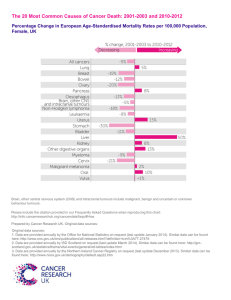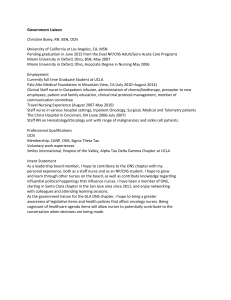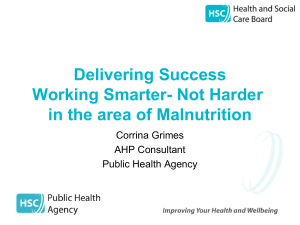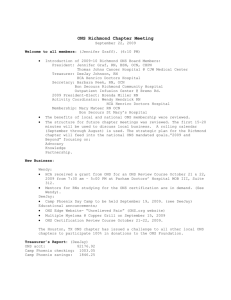SCCG Oral Nutritional Supplements Guidelines
advertisement
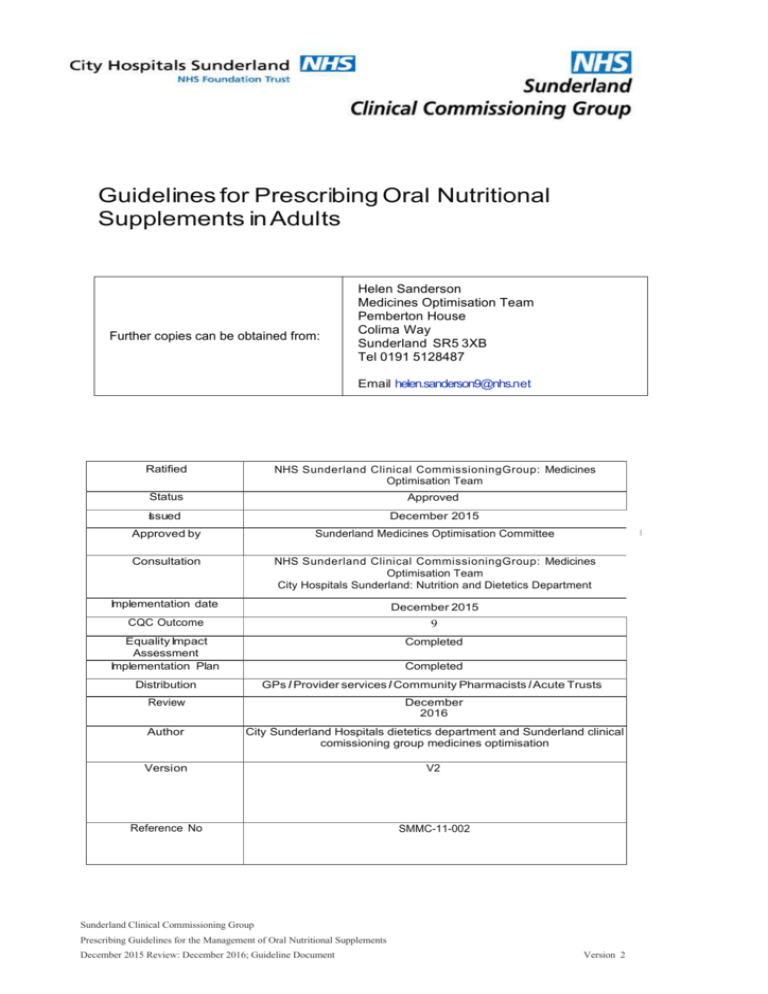
Guidelines for Prescribing Oral Nutritional Supplements in Adults Further copies can be obtained from: Helen Sanderson Medicines Optimisation Team Pemberton House Colima Way Sunderland SR5 3XB Tel 0191 5128487 Email helen.sanderson9@nhs.net Ratified NHS Sunderland Clinical CommissioningGroup: Medicines Optimisation Team Status Approved Issued December 2015 Approved by Sunderland Medicines Optimisation Committee Consultation NHS Sunderland Clinical CommissioningGroup: Medicines Optimisation Team City Hospitals Sunderland: Nutrition and Dietetics Department Implementation date December 2015 CQC Outcome 9 Equality Impact Assessment Implementation Plan Completed Distribution GPs I Provider services I Community Pharmacists I Acute Trusts Review December 2016 Author City Sunderland Hospitals dietetics department and Sunderland clinical comissioning group medicines optimisation Version V2 Reference No SMMC-11-002 Completed Sunderland Clinical Commissioning Group Prescribing Guidelines for the Management of Oral Nutritional Supplements December 2015 Review: December 2016; Guideline Document Version 2 Sunderland Clinical Commissioning Group Prescribing Guidelines for the Management of Oral Nutritional Supplements December 2015 Review: December 2016; Guideline Document Version 2 Sunderland Clinical Commissioning Group Guidelines for Prescribing Oral Nutritional Supplements in Adults INTRODUCTION • • • • • Prescribing supplements are relatively expensive for the NHS. Alternative methods can be used to supplement dietary intake without prescribing supplements. Audits have shown that oral nutritional supplements (ONS) are often initiated inappropriately or continued unnecessarily and without adequate review. This document provides guidance to healthcare professionals working in the community on the recommended step-wise nutritional support for people in Sunderland. The cost of prescribing ONS in Sunderland was over £830,000 in 2014/15. AIMS OF THIS GUIDELINE The aim of the guideline is to support clinicians in the management of ONS in primary care, to ensure consistency of care across Sunderland and to ensure appropriate, rational and cost effective prescribing of medicines and best use of NHS resources. Implementation of the guideline will improve the overall management of patients taking ONS. DEVELOPMENT This guideline is an updated version of the 2011 document ‘Guidelines for Prescribing Sip Feeds in Adults’ produced by NHS South of Tyne and Wear. The updates have been provided and agreed by: Sunderland Clinical Commissioning Group City Hospitals Sunderland Head of Dietetics: Scott Covington Medicines Management Specialist Dietitian: Eleanor Gratton Further distribution for comment:Sunderland Clinical Commissioning Group Sunderland Clinical Commissioning Group Prescribing Guidelines for the Management of Oral Nutritional Supplements December 2015 Review: December 2016; Guideline Document Version 2 Guideline suitable for: This guideline is to provide advice and support on the prescribing of ONS in primary care in Sunderland. The guidelines are appropriate for use for adults and children aged 12 years and older. Guideline not suitable for: This guideline should not be used to advise on the prescribing of ONS for children under the age of 12. Special advice for the prescription of ONS for patients who are receiving end of life care or have drug or alcohol problems is given at the end of this document. Areas covered in this guideline 1. Guidance on when to refer for specialist dietetic input 2. The first steps in offering nutrition support, including food first advice 3. When it might be appropriate to consider prescribing ONS 4. ONS use in special cases 5. Sunderland ONS Formulary (Appendix 1) 6. Nutrition Support Flow Chart (Appendix 2) 7. Alternative measurements (Appendix 3) It is not the remit of this guideline to cover all aspects of malnutrition. Nutrition Assessment Tools A suitable tool for screening for malnutrition is the MUST (Malnutrition Universal Screening Tool) developed by BAPEN (bapen.org.uk). Sunderland Clinical Commissioning Group Prescribing Guidelines for the Management of Oral Nutritional Supplements December 2015 Review: December 2016; Guideline Document Version 2 Key Recommendations Clinicians are advised to follow national guidance on nutritional assessment. If patients are able to take oral diet it is important to encourage high calorie/protein food first before starting supplements. o These guidelines include appropriate advice to fortify ordinary foods, which are culturally acceptable and the use of over the counter supplements. o Further advice is available from the following link: www.bapen.org.uk/tacklingmalnutrition/nutritional-advice-and-information/treating-malnutrition/food-first-project Ideally, ONS should only be prescribed on the advice of a dietitian. If it is felt that ONS are required before the dietitian is able to see the patient, ONS should be prescribed with reference to the Sunderland CCG Formulary (appendix 1) and the patient referred to the dietetic department. All supplements should be issued via acute prescriptions rather than repeat. Unless specified by the patient or dietitian new ONS should be prescribed in mixed flavours until taste preferences have been ascertained. When patients are discharged from hospital with ONS on prescription, these should only be continued if the GP practice receives a care plan from the patient’s dietitian following discharge. If a practice does not receive specific set goals with regards to the initiation or continuation of nutritional supplements from the hospital/dietetic department, they should not continue to issue the prescription, or to issue it for a maximum of 4 weeks and then stop. If no care plan is received, but the practice feels that the patient would benefit from nutrition support, the patient should be referred to community Dietetics. Care or nursing home residents who may require ONS should be referred to the dietitian for a review. Practices should ensure this is actioned and should not prescribe for patients simply on request. Sunderland Clinical Commissioning Group Prescribing Guidelines for the Management of Oral Nutritional Supplements December 2015 Review: December 2016; Guideline Document Version 2 Indications for ONS Prescribing Oral Nutritional Supplements are only prescribable for the management of the following conditions as recommended by the Advisory Committee on Borderline Substances (ACBS). These are:• • • • • • • • Short bowel syndrome Intractable malabsorption Pre-operative preparation of patients who are malnourished Proven inflammatory bowel disease Total gastrectomy Dysphagia Disease related malnutrition Bowel fistulae Reviewing the Need for Nutritional Supplementation Reviewing the Need for Nutritional Supplementation For any individual patient, the following stages should apply. Nutritional supplements should usually only be initiated after stages 1-4 have been completed and the nutritional intake is still inadequate. Dietetic input may be appropriate at all stages depending on the individual circumstances. 1. 2. 3. 4. 5. 6. 7. 8. Identification Overall assessment Goal setting Non-prescribable and OTC supplementation Initiating prescribable ONS Review Termination of ONS Follow up review Specialist Dietetic Input Dietetic intervention may be appropriate in any of the following circumstances: • • To assist in appropriate planning and goal setting for nutritional support for individual patients. To advise on nutritional supplementation strategies and the appropriateness or otherwise of initiating ONS. • Deterioration in nutritional status despite supplementation after excluding other contributory pathology. • Cultural, social or religious influences affecting dietary intake. • The presence of co-existing medical conditions such as diabetes, renal failure, coeliac disease or high cardiovascular risk. • Where swallowing difficulties or other indications for modified food texture exist. • Unexplained weight loss and/or wound healing issues. Sunderland Clinical Commissioning Group Prescribing Guidelines for the Management of Oral Nutritional Supplements June 2015; Guideline Document Version 1 Stage 1: Identification Sunderland Clinical Commissioning Group Prescribing Guidelines for the Management of Oral Nutritional Supplements June 2015; Guideline Document Version 1 Ideally MUST should be used to identify patients at risk of malnutrition (for more information see: http://www.bapen.org.uk/pdfs/must/must-full.pdf). As a minimum, the patient’s BMI (kg/m2) and recent weight loss should be calculated. Individuals in the following categories are likely to be at high risk of malnutrition and will require intervention: • • • If BMI is < 18.5 If BMI is < 20 with unintentional weight loss of >5% in the last 3-6 months If BMI is > 20 with unintentional weight loss of >10% in the last 3-6 months NICE (2006) guidelines recommend that all patients are screened for malnutrition when they are registered with a new GP practice and at times when there are clinical concerns (unintentional weight loss, fragile skin, poor wound healing, apathy, wasted muscles, poor appetite, altered taste sensation, impaired swallowing, altered bowel habit, loose fitting clothes or prolonged intercurrent illness). In cases where obtaining weight or height measurements is impossible, Mid Upper Arm Circumference can be used to estimate BMI (see appendix 3). Treat the underlying medical conditions, e.g. nausea, pain and recognise increased nutritional requirements e.g. cancer, pressure sores. Stage 2: Overall Assessment Consider factors such as: • • • • • • Availability of an adequate diet and cultural acceptability of foods Total food and drink intake Issues with dentition Medication (consider taste changes/any that may suppress appetite) Medical prognosis (appropriate intervention) Consider referral to Speech and Language Therapy (SALT) if problems with swallowing Stage 3: Goal Setting # Realistic and measurable goals should be established and documented for each patient in order to identify the end point of treatment. Suitable goals could include: • • • • • Attaining a target BMI within the healthy range (18.5-25) Weight stabilization Appetite returned to normal Completion of wound healing Reduced rate of weight loss where weight stabilization is not realistic (e.g. cancer cachexia, end of life care) Stage 4: Initial Treatment Sunderland Clinical Commissioning Group Prescribing Guidelines for the Management of Oral Nutritional Supplements June 2015; Guideline Document Version 1 Goals can often be achieved by fortification of normal diet and/or addition of 'over the counter' nutritional supplements. First line • • • • • Eat ‘little and often’. Aim for 3 small nourishing meals and 2-3 additional snacks throughout the day. Aim to eat every 2-3 hours throughout the day Fortify full cream milk (4 heaped tablespoons of dried skimmed milk powder to 1 pint of full cream milk) and drink 1 pint each day If milk is not tolerated, try other calorific fluids e.g. fruit juice, carbonated drinks, soups Add or increase amounts of high-energy foods such as full cream milk, cheese, butter, cream, sugar etc. to maximise calorie and protein intake Choose foods that are enjoyed http://www.bapen.org.uk/tackling-malnutrition/nutritional-advice-and-information/treatingmalnutrition/food-first-project/ After implementing this stage, the patient should be reviewed in 4 weeks to evaluate the success of the nutrition support. The patient’s weight and general condition should be checked. If there has been an improvement in their condition see stage 6. If there is no improvement or a further deterioration, see stage 5. Consider referral to a Dietitian. Second line – over the counter ONS Patients who have unplanned weight loss should be encouraged to increase their food intake by having regular meals and extra snacks as per ‘Little and Often’, however if there is no improvement the use of products such as Meritene® and Complan® may be considered in the short term. Meritene® or Complan® are useful to replace an occasional missed meal and can also be added to puddings, cereal and soups. Meritene® and Complan® can be used providing they are not contraindicated by diabetes, renal disease, milk allergy or vegan diet. Patients with these specialist dietary requirements should be referred to a dietitian. The patient should be reviewed in 4 weeks and the implemented nutrition support evaluated. Sunderland Clinical Commissioning Group Prescribing Guidelines for the Management of Oral Nutritional Supplements June 2015; Guideline Document Version 1 Stage 5: Initiating the Prescription of Oral Nutritional Supplements Prescription of short-term (up to 1 month) ONS should only be initiated after at least 4 weeks of food fortification, after non-prescribable or OTC supplements are inappropriate or have failed despite adequate duration and if the criteria set out in the NICE guidance is met (http://www.nice.org.uk/guidance/CG32). The prescribing of ONS should NOT be considered for first line advice except when the patient is at high risk of malnutrition as defined by screening. Such circumstances may include severe dysphagia or swallowing difficulties, malabsorption disorders, and jaw wiring. ONS are often poorly tolerated. It is helpful to give an initial short-term prescription of a variety of flavours until taste preferences have been established. 'Repeat' prescriptions should not be issued. It is recommended that all ONS be prescribed using 'acute' prescriptions as this has been demonstrated to reduce waste. While the patient awaits dietetic review, the formulary (appendix 1) should be used for guidance in choosing the most appropriate product. Dietitians will advise on nutritional support strategies and the appropriateness of initiating ONS. A patient should be referred to a dietitian if a prescription is considered to be necessary for more than 1 month. The patient should be reviewed in 4 weeks to monitor weight and check ONS compliance. If there is an improvement see stage 6. If there is no improvement, or a deterioration refer to dietetics for specialist tailored advice. Stage 6: Review Any patient receiving prescribed ONS or who has been given advice on food fortification should be reviewed regularly. It is the responsibility of the prescriber to ensure that there is a designated health professional who will undertake appropriate monitoring, in accordance with set goals. It is recommended that patients are reviewed on a 4 weekly basis until the set goals have been achieved. Stage 7: Termination of ONS Prescription Prescribing of ONS should remain on acute prescriptions even if long-term. Providing that an effective plan has been prepared at the outset, it should be possible to clearly identify the point at which the prescription of supplements can be stopped, e.g. BMI within healthy range (18.5- 25), patient has re-established a normal dietary intake (regular meals and snacks), appetite returned to normal, weight stabilised. The prescribing GP should end the prescription once goals are reached or on the advice of the dietitian. Stage 8: Follow up review Once goals are achieved, the patient should be reviewed again after 3 months to ensure there is no recurrence of the initial problem. If there are no further issues monitoring should continue as documented earlier in these guidelines. If there is future recurrence of malnutrition, the pathway should be re-started at stage 1. Sunderland Clinical Commissioning Group Prescribing Guidelines for the Management of Oral Nutritional Supplements June 2015; Guideline Document Version 1 Prescription of ONS in Special Cases Use of ONS for people receiving end of life care These guidelines are not suitable for use in patients who are receiving end of life care. These patients have shorter timescales, different aims and generally will not gain weight. In this group the target should be patient focused and primarily the enjoyment of nutrition. The restrictions around prescribing and use of ONS therefore do not apply. However if prescribed they should still be reviewed regularly. Use of ONS for in substance misuse There are many issues associated with substance misuse which can result in poor dietary intakes and lead to malnutrition. These include poor appetite (particularly with opioid use), poor dental hygiene, chaotic social circumstances (leading to issues with food preparation) and related medical conditions such as Hepititis C or liver disease. The prescription of ONS is unlikely to resolve underlying issues with regard to poor dietary intakes and the focus of nutritional treatment should be on introducing a more reliable and regular eating pattern. It has been suggested that patients with substance misuse problems may use ONS inappropriately, with the aim of saving money that otherwise would be spent on food to increase their budget for purchasing drugs or alcohol. Patients who are known to abuse any substance should not be prescribed ONS except in the following circumstances: 1. BMI < 18.5kg/m2 2. Pregnant and failing to gain weight 3. Co-existing medical condition that may affect nutritional status (e.g. throughout the treatment period for Hepatitis C, liver disease) If ONS are initiated, the following guidelines should be considered: 1. 2. 3. 4. Maximum of 600kcal per day (see Appendix 1) Review monthly If a follow up appointment is missed, ONS should be stopped If there is no change in weight at 3 months, it should be considered whether the ONS are being used appropriately (i.e. in addition to, not instead of normal diet) 5. ONS should be stopped when BMI is > 18.5kg/m2 unless other issues are known (see above). Sunderland Clinical Commissioning Group Prescribing Guidelines for the Management of Oral Nutritional Supplements June 2015; Guideline Document Version 1 Appendix 1: ONS Formulary GP Guidance Starting Oral Nutritional Supplements in Primary Care A guide to GP prescribing of Oral Nutritional Supplements (ONS) while awaiting dietetic review. Oral nutritional supplements should only be prescribed after first line dietary advice (including food fortification) and over the counter build up drinks have been tried. Click here* for more information. Key recommendations for prescribing Oral Nutritional Supplements Product choices are shown in the table below. Give acute prescriptions on a short term basis (1 bd), starting with a variety of flavours and refer the patient to the Dietitian for review. First Line If the patient or carer can prepare drinks (including patients in care homes) start a powdered ONS. Second Line If the patient needs a ready-made supplement use a milk-style 1.5kcal/ml ONS. A 125ml 2.4kcal/ml ONS may be preferable for patients with a poor appetite who may struggle to manage a 200ml ONS twice a day. Juice style ONS are beneficial for those who do not like milk, but are typically lower in protein, fat and micronutrients than milk style ONS. They may not be suitable for people with Diabetes (please consult the Dietetic department for advice). Product Choices Flavours Presentation Kcal/unit** Price/unit (£) Food Link Complete Natural, strawberry, banana, chocolate, vanilla 57g sachet 386 0.61 Aymes Shake Natural, strawberry, banana, chocolate, vanilla 57g sachet 388 0.70 Powdered ONS ** made with 200ml whole milk Sunderland Clinical Commissioning Group Prescribing Guidelines for the Management of Oral Nutritional Supplements June 2015; Guideline Document Version 1 Milk style ONS (1.5 kcal/ml) Flavours Presentation Kcal/unit Price/unit (£) Aymes Complete Banana, strawberry, chocolate, vanilla 200ml bottle 300 1.26 Fortisip Bottle neutral, vanilla, chocolate, toffee, banana, orange, strawberry, tropical fruit 200ml bottle 300 1.40 Flavours Presentation Kcal/unit Price/unit (£) 125ml bottle 300 1.45 125ml bottle 300 1.45 Presentation Kcal/unit Price/unit (£) 200ml bottle 300 1.88 220ml bottle 330 1.97 Milk style ONS (2.4 kcal/ml) Nutriplen Fortisip Compact Strawberry, vanilla, harvest chocolate, banana Vanilla, strawberry, banana, mocha, apricot, forest fruit, chocolate Juice style ONS (1.5kcal/ml) Fresubin Jucy Drink Ensure Plus Juce Flavours Blackcurrant, cherry, apple, orange, pineapple Apple, fruit punch, lemonlime, orange, peach, strawberry *Please note, patients may be discharged from CHS on Nutricia products. This is for contractual reasons only. Patients should be treated as per this guideline in primary care Other ONS should only be prescribed on the request of a Dietitian to ensure that the patient’s nutritional requirements are being met. Sunderland Clinical Commissioning Group Prescribing Guidelines for the Management of Oral Nutritional Supplements June 2015; Guideline Document Version 1 Appendix 2: Nutrition Support Flowchart 1. Recognition of patients at risk of malnutrition Ideally use MUST (see guidelines) If BMI < 18.5 If BMI < 20 with unintentional weight loss of >5% in 3-6 months If BMI > 20 with unintentional weight loss of >10% in the last 3-6 months 2. Assessment Swallowing problems consider referral to SALT Consider: Issues with dentition Availability of an adequate diet Medication (affect on appetite/taste changes) Medical prognosis Consider referral to Dietitian 3. Goal Setting Establish realistic, measurable goals E.g. - BMI >18.5 - Reduce nutritional losses - Support wound healing 4. Treatment Plan – Food First Approach - Food fortification - Delivery services e.g. Wiltshire Farm Foods - Consider medication changes - Denture replacement - ‘Over the counter’ supplements (e.g. Build-up & Complan) 5. REVIEW Monthly IMPROVEMENT - BMI within healthy range (18.5-25) - Regular food intake - meals & snacks - Appetite returned to normal Refer to Dietitian NO IMPROVEMENT – If concerned start Oral Nutritional Supplements (ONS) - Only start after at least 4 weeks food fortification - See formulary for suitable ONS (http://sunderlandccg.nhs.uk/wpcontent/uploads/2014/05/SCCG-ONS-FormularyFINAL.pdf) If on supplements stop them Sunderland Clinical Commissioning Group Prescribing Guidelines for the Management of Oral Nutritional Supplements June 2015; Guideline Document Version 1 Appendix 3: Estimating Body Mass Index If neither height nor weight can be measured or obtained, BMI can be estimated using the mid upper arm circumference (MUAC) Measuring mid upper arm circumference (MUAC) • • • • The subject should be standing or sitting. Use left arm if possible and ask subject to remove clothing so arm is bare. Locate the top of the shoulder (acromion) and the point of the elbow (olecranon process). Measure the distance between the 2 points, identify the mid point and mark on the arm. Ask subject to let arm hang loose with tape measure, measure circumference of arm at The mid point. Do not pull the tape measure tight - it should just fit comfortably round the arm. Weight change over time MUAC can also be used to estimate weight change over a period of time and can be useful in subjects in long term care. MUAC needs to be measured repeatedly over a period of time, preferable taking 2 measurements on each occasion and using the average of 2 figures . 2 If MUAC is less than 23.5cm, BMI is likely to be less than 20kg/m i.e. subject is likely to be underweight. 2 If MUAC is more than 32.0cm, BMI is likely to be more than 30kg/m i.e. subject is likely to be obese. If MUAC changes by at least 10% then it is likely that weight and BMI have changed by approximately 10% or more. Reference: The 'MUST’ explanatory booklet: http://www.bapen.org.uk ‘Guidelines for prescribing sip feeds in adults’ NHS South of Tyne and Wear 2011
